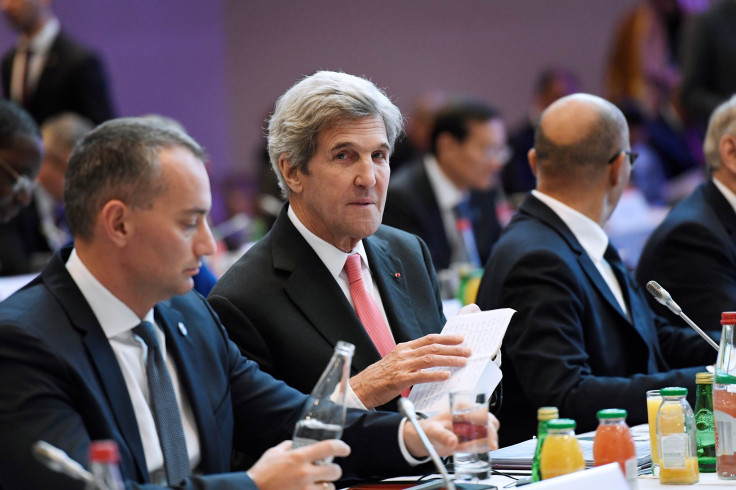Will The US Move Its Embassy To Jerusalem? Diplomats Warn Against Move As Paris Mideast Conference Seeks To Restart Peace Talks

Dozens of countries called on Israel and the Palestinians to recommit to a two-state solution Sunday at a Middle East peace conference in Paris and urged the United States not to move the U.S. Embassy from Tel Aviv to Jerusalem as President-elect Donald Trump has promised.
Hundreds of pro-Israel demonstrators rallied outside the Israeli Embassy in Paris as the conference took place.
Diplomats attending the conference, which did not include representatives from Israel, the Palestinians or the incoming U.S. government, expressed concerns over the possibility of moving the embassy, with U.S. Secretary of State John Kerry warning, “This is not the right time” and “We think it’s ill-advised.”
“We will move the U.S. Embassy to the eternal capital of the Jewish people, Jerusalem,” Trump pledged during the presidential campaign. Lately he has tempered the pledge by suggesting the embassy could remain in Tel Aviv while the ambassador works out of the consulate in Jerusalem.
European diplomats have warned moving the embassy could unleash further violence.
“It’s very dangerous,” a diplomat told CNN. “Chances for the peace process are going very quickly — it’s now or never. Violence is always a concern and, at this point, it’s probably easy for Palestinians to demonstrate their frustration.”
Palestinian President Mahmoud Abbas has warned Trump moving the embassy would be a mistake.
"Any statement or position that disrupts or changes the status of Jerusalem is a red line, which we will not accept," he said in a recent speech.
British officials said they feared the Paris conference risked “hardening positions.”
"We have particular reservations about an international conference intended to advance peace between the parties that does not involve them — indeed which is taking place against the wishes of the Israelis — and which is taking place just days before the transition to a new American president when the U.S. will be the ultimate guarantor of any agreement," a Foreign Office statement said.
The final Paris communiqué made no mention of the U.S. Embassy. In addition to calling for a recommitment to the two-state concept, it called for recognition of the Palestinians’ right to statehood as well as Israeli security needs.
Oustanding issues include the status of Jerusalem, Palestinian refugees, settlements, security and borders.
France and other countries fear the incoming Trump administration could stoke tensions in the region by condoning settlements in areas claimed by the Palestinians.
"The parties remain very distanced in a relationship of defiance, which is particularly dangerous, and no one is immune to a new explosion of violence," French Foreign Minister Jean-Marc Ayrault told delegates.
"There will not be regional peace, solid and durable, as long as the conflict with the Palestinians will not be resolved."
Israeli Prime Minister Benjamin Netanyahu called the conference “rigged,” characterizing it as an attempt to force Israel to accept conditions against its national interests. Many members of Netanyahu’s coalition want to abandon the two-state solution and have called for the annexation of parts of the West Bank. They rejected the conference, calling instead for direct negotiations, something that hasn’t happened since 2014.
The final communiqué from Sunday’s meeting criticized incitement and terror, a reference to Palestinian attacks, but also lauded last month’s U.N. resolution condemning Israeli settlement activity — the U.S. broke with tradition and abstained from voting on the resolution rather than vetoing it.
The Australian government distanced itself from the final communiqué, with a spokesperson for the office of Foreign Minister Julie Bishop telling the Australian Broadcasting Corp. the government did not agree with everything in the document. Australia last month labeled the U.N. resolution “one-sided” and “deeply unsettling.”
Kerry said Israeli criticism of the conference was unwarranted and emphasized the necessity of a two-state solution.
Netanyahu has given lip service to the concept of a two-state solution but has repeatedly approved settlement construction in East Jerusalem and the West Bank, something Palestinians say must stop if an agreement ever is to be reached.
© Copyright IBTimes 2025. All rights reserved.






















